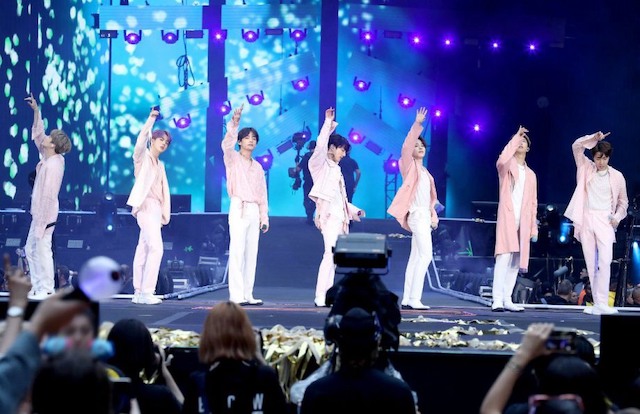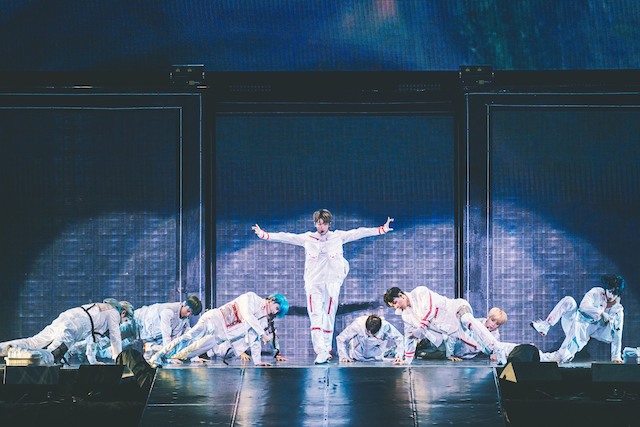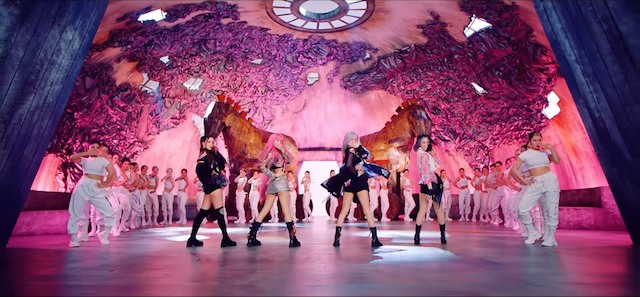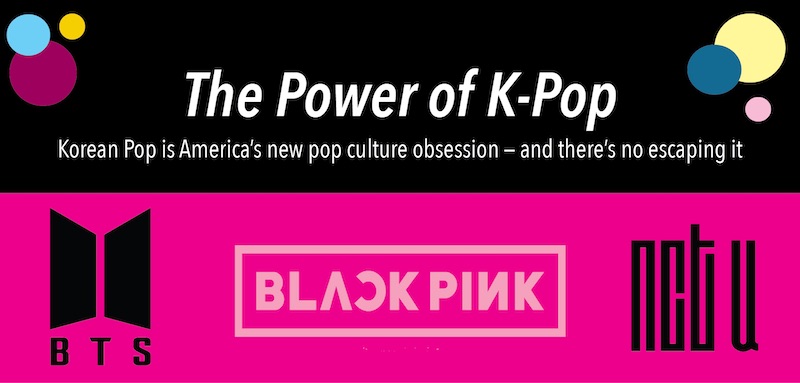Korean Pop is America’s new pop culture obsession—and there’s no escaping it
It’s fair to think of Korean pop music, K-Pop to its fans, as a three-year-long tsunami. Sure, before crashing onto America’s shores back in 2017 there were occasional splashes. The United States went crazy for Psy’s “Gangnum Style,” after all, but that was just a precursor to the K-Pop surge happening right now. K-Pop is washing over the entire country, flooding Twitter threads, Spotify playlists and TikTok videos. This wave seems endless.
The reason: For its fans, K-Pop isn’t just a music genre. It’s a culture, a fandom and one of the main pillars of their life. It’s an outlet that provides them an escape from all of the trauma and negativity in the world.
“K-Pop is like the friend I never knew I needed,” says Yinka Akindebe, a 17-year-old from Bloomfield, New Jersey. “It can comfort me, make me laugh and make me cry.”
Akindebe is far from alone. In a year made for streaming—thanks pandemic—K-Pop bands have actually managed to increase sales of physical copies on their new albums. Recently released albums by K-Pop bands Blackpink and NCT sold more than a million copies in pre-orders alone.
The seven-piece boy band BTS is the pinnacle of everything that K-Pop is. They dominate the entire music genre. They’ve broken ground and broken records. They were the first K-Pop group to perform at a U.S. award show back in 2017. They have the second most viewed YouTube video in the first 24 hours. They became the first K-Pop band to have a song hit No.1. on the Billboard charts with “Dynamite” back in September. They also have the most Twitter engagements ever. They even had a week-long residency on The Tonight Show Starring Jimmy Fallon which resulted in the “Most Social Week” in Late-Night TV history. What that means: The late-night show’s total social engagement was up approximately 1300%, yielding its most social week in the series’ history.

K-Pop has also altered Nicole Santero’s world in a big way. She’s a BTS superfan who is currently pursuing her PhD in sociology at the University of Nevada, Las Vegas. She’s also a part of the BTS ARMY, the legion of devoted fans of the band, and runs a Twitter account, @ResearchBTS, dedicated to the group, their performances and updates. Since starting the account in 2019, the account has over 82,000 followers.
“I initially created this account for personal reasons, simply to keep track of different trends and data for my own research purposes,” Santero said. “I would have never expected for it to become what it is now.”
Santero became a fan back in 2018. She quickly learned that the BTS fanbase is more than just a group of boy band admirers. It’s an entire community and culture that one joins. Santero decided to go all in. It changed her life, BTS and their fans inspiring her to push forward and further her career.
“After my master’s, I was so burnt out, and as much as I wanted to go after a PhD, I didn’t really have the motivation to keep going anymore,” Santero said. “But BTS and ARMY lit this fire in me and inspired me to do so, and that’s why they’re so important to me and have become a big aspect of my life.”
Through Twitter accounts like @ResearchBTS, Santero has been able to cross paths and become friends with people all over the world, all because of their shared love of one band. This is what makes the BTS ARMY more than just a usual fandom.
“Not only are they incredible performers, but their music is so meaningful and has resonated with a lot of people from every part of the world,” Santero said.
“They are further proof that language does not
Nicole Santero
have to be a barrier and that music has the
ability to unite us.”
Another popular K-Pop boy band is Neo Culture Technology or NCT for short. This group features 10 members, which is huge for a boy band. It also provides more boys for the fans to become obsessed with and to form gooey crushes on.

NCT is Akindebe’s favorite band. She can remember the exact day that she became a K-Pop fan: when NCT released their song “Touch” in 2018. K-Pop music has defined her high school experience and is even affecting her future plans.
“K-Pop has inspired me to focus on East Asian Studies in college and strive to know at least Japanese, Korean, and Chinese before I turn 30,” Akindebe said.
K-Pop is genre bending, and that’s one of Akindebe’s favorite aspects. She loves how the style and trends of the music is always changing.
“Right now, disco funky music is popular with beats mimicking the ‘70s,” Akindebe said. “K-Pop also borrows from outside influences like hip hop and R&B.”
Sarah Wirt is a senior at the University of California in Santa Cruz. She attended high school in Missouri but moved to California for school in 2017. There is a huge following in the Bay Area, and this is when she began to be a K-Pop fan.
“So many here love and are drawn to it, especially being so close to the Bay Area,” Wirt said. “Once I had been shown some videos of BTS my first year of college, I was hooked.”
Wirt’s favorite groups not only include BTS, and also Blackpink, an all-female group with four members. While there are some similarities between Blackpink and groups like Little Mix and Fifth Harmony, Blackpink is on a whole different level. The power group holds four of the top ten spots of the most viewed YouTube videos in the first 24 hours of release.

With K-Pop, Wirt believes it’s very black and white: You’re either super into it or you don’t even give it a chance.
“Of course I was aware of K-Pop in high school, but because of where I lived, not one person I associated with ever listened to the genre so I had never even heard any of it before,” Wirt said. “But once I gave it a chance here in California, I really admired and appreciated it for the art that it is. Once you’re educated on K-Pop as a whole, its cultural impact, and just how talented these human beings are you become a stan.” For K-Pop fans, the rich culture is why these groups have garnered such a massive following. It’s almost political. You either love K-Pop or hate it. You get the culture and the fandom or you don’t. There are no casual K-Pop fans. There are only obsessives or so-to-be obsessives, ensuring the K-Pop tsunami won’t retreat any time soon.

